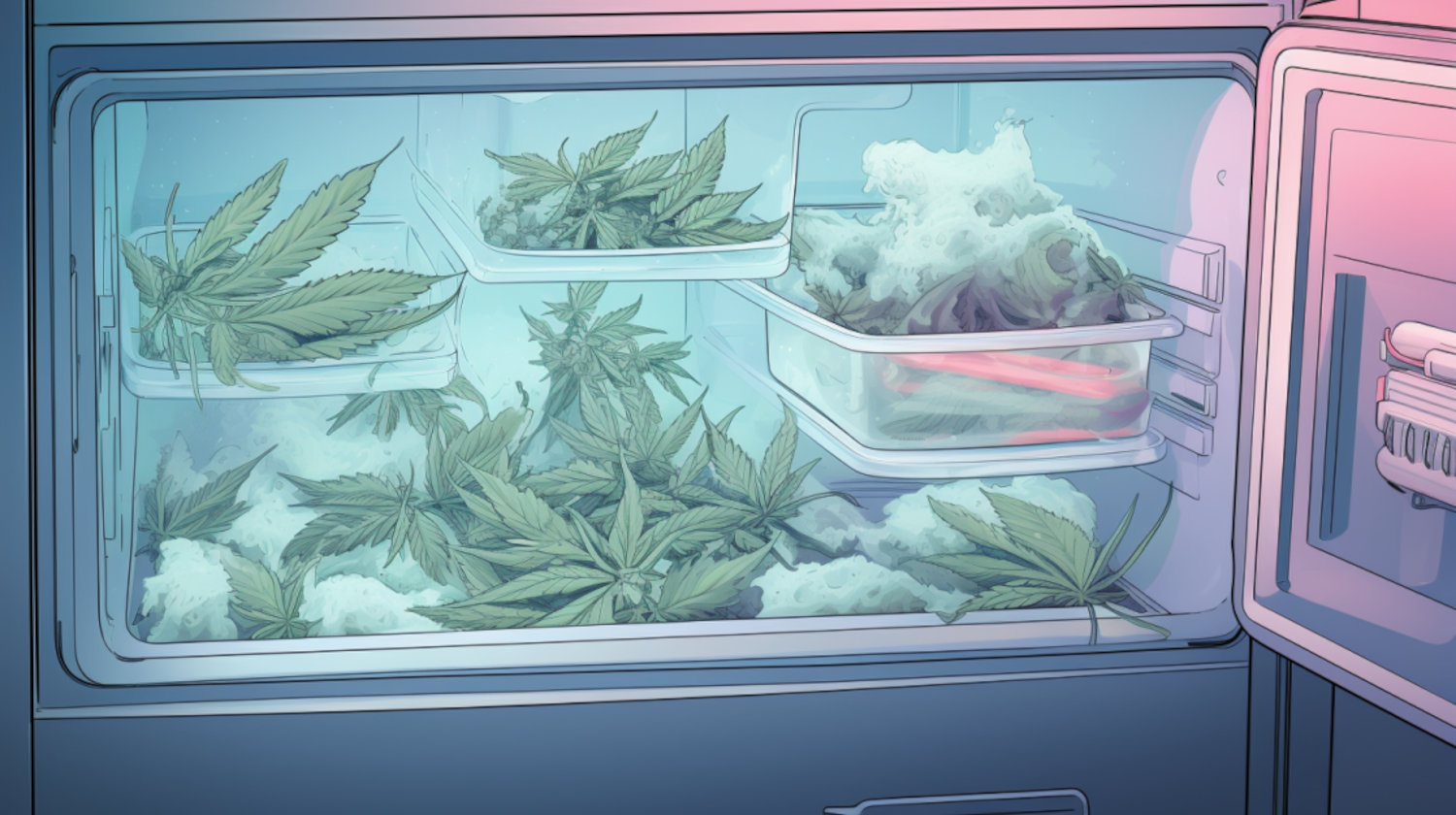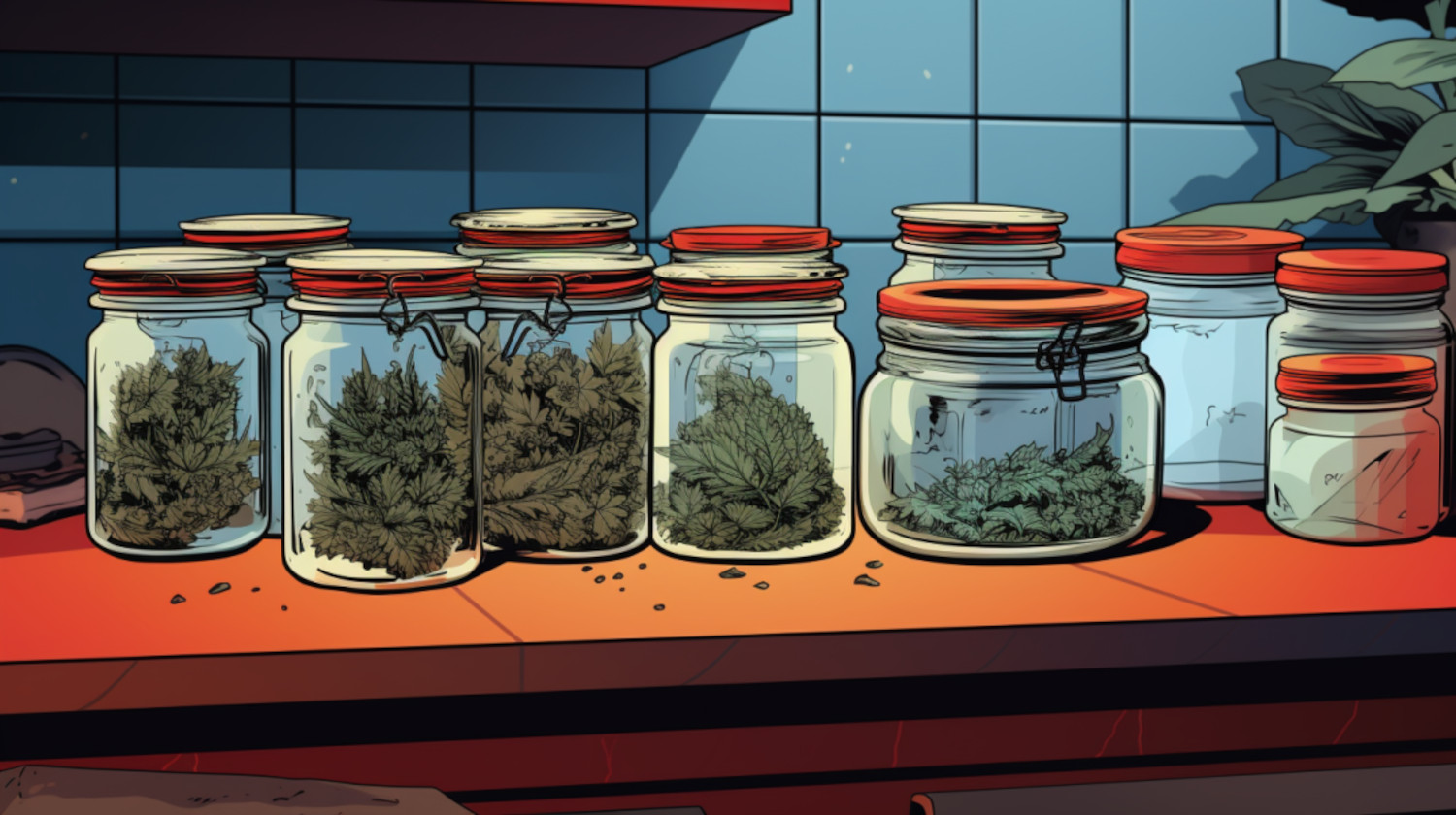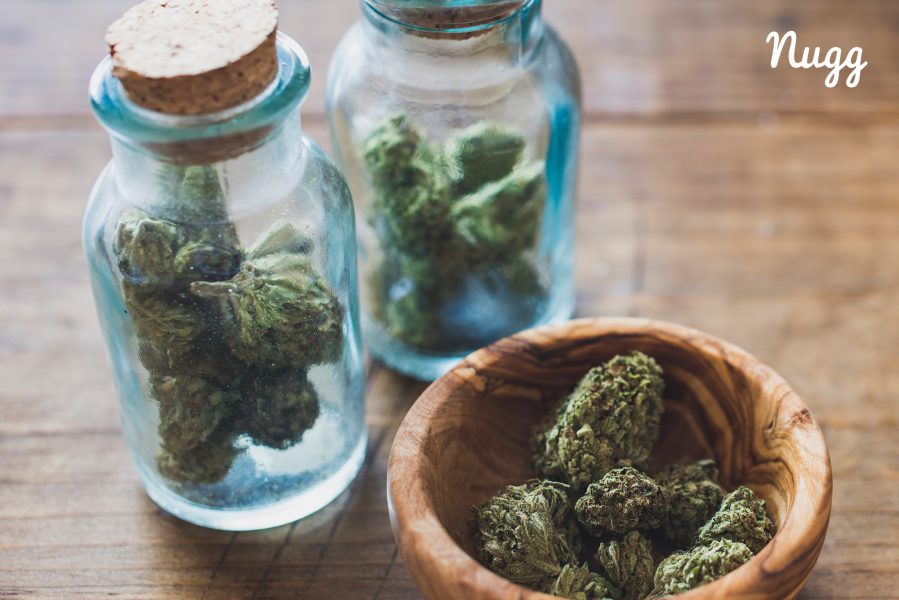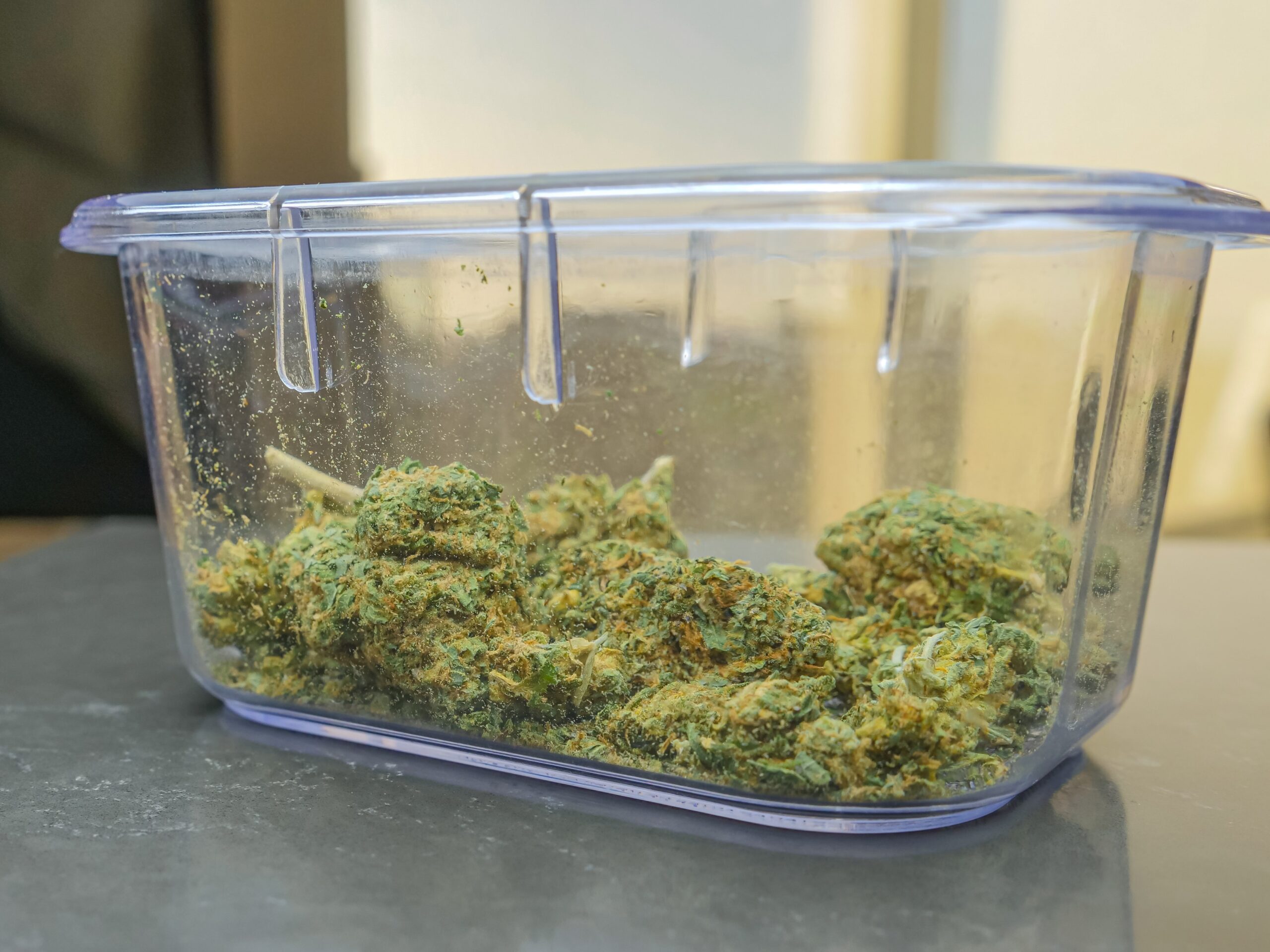Like just about everything else in this world, weed can certainly go stale. Cannabis typically stays fresh for around one year if stored properly. After that, or whenever your cannabis does go south, it's best not to use it. While your bud may look relatively the same in structure, it no longer has the THC you expect it to be.
But thanks to modern advancements in weed cultivation and processing, cultivators and manufacturers are learning many processes to help maintain and preserve our pot for as long as possible. Freezing weed has become a critical step for many brands and consumers in recent years. The process is quite popular and seemingly somewhat effective in creating various products and experiences.
So, can you freeze weed? You're darn right you can! Some would even say you should be freezing your weed (but only in certain circumstances).
Does Weed Go Bad?
It typically takes a while, but cannabis does go bad over time. If not stored correctly, cannabis will see a decline in quality. The plant will lose some of its physically pleasing aesthetics while the cannabinoid and terpene content alters over time. Other risks, including mold, are also common.
Proper storage is critical to preserving any type of organic matter. With cannabis, exposure to elements like sunlight, heat, and humidity increases the degradation process. Some of the noticeable signs of expired weed include:
- a loss or change in flavor
- a putrid aroma
- an increasingly brittle texture
Other types of cannabis products, ranging from tinctures to topicals and edibles, have varying expiration dates. Be sure to get the expiration date of any product you pick up if you think you will be holding on to it for some time.
As cannabis goes bad, its critical terpenes and cannabinoids break down. Most notably, THC, the intoxicating component associated with the high effect, breaks down into an entirely different cannabinoid, CBN. CBN has slightly less binding affinity for the CB1 receptors compared to THC, so it can still create an intoxicating effect.
CBN has been said to deliver more sedative effects, but there is no clinical research supporting this, and researchers suggest it may have more to do with the THC content.1
The quality of the high may also diminish as terpenes and cannabinoids degrade over time. The breakdown of the terpenes will be most notable in the changing aroma or flavor. However, terpenes also play a critical role in creating a plant profile's effects.
Even if you can somehow get through the diminished experience – and potentially awful taste and flavor – it's still not recommended that you consume old weed. Sure, using old weed might not be pleasant, but using moldy weed should be strictly off-limits.
Benefits of Freezing Weed
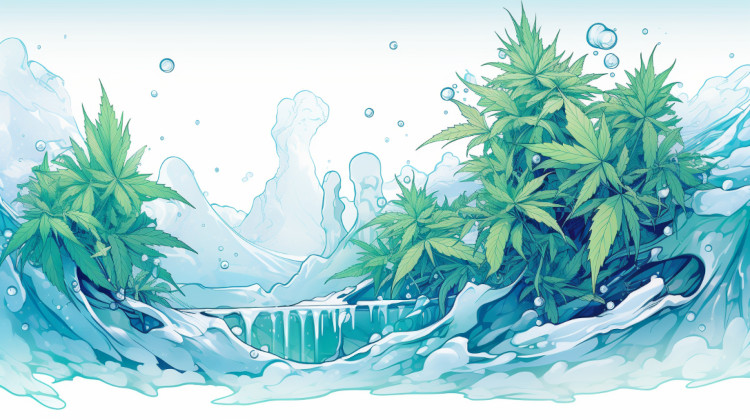
Freezing weed certainly has its benefits. That said, it isn't going to help most everyday consumers. Putting weed in the freezer sounds simple enough, but that's a basic summation of a multi-step process that most of us don't have the tools to pull off.
The freezer found in your kitchen isn't going to get the job done when it comes to taking care of your flowers. That's why freezing weed is only recommended for processors. And it isn't just freezing; it's freeze-drying.
So what's the difference?
Processors place freshly harvested cannabis buds into a freeze dryer to help slow down the decarboxylation of cured flowers. Slowing this process down helps maintain the plant's terpene and trichome content, helping preserve as much of the plant's flavor, aroma, and effects as possible.
This process has become the foundation of what we now know as "live" concentrates. Popular products such as live resin, live rosin, and ice hash are made using freeze-dried, freshly harvested flowers. Those buds remain in the freeze dryer until they are ready for extraction. From there, processors use various methods to extract the oil inside the flower. In just a few short years, live resin and live rosin have become some of the most popular products among extract connoisseurs, citing the products' robust flavor and aroma profiles (not to mention they are incredibly potent, too).
There are a few other products you can freeze as well. Edibles, concentrates/extracts, and topicals may be freezable. But keep in mind that they will still degrade over time.
Drawbacks to Freezing Weed
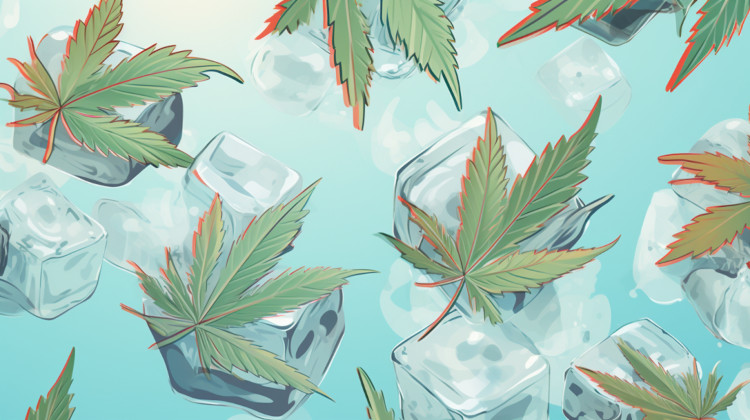
Freezing weed can undoubtedly do wonders for plant quality and longevity. But that isn't always going to be the case.
If you aren't a processor, it's best to stick with the tried and true storage methods.
Exposing your flower to cold or extremely cold conditions isn't a surefire way to protect the plant. Mishandling the process can lead to lower THC levels and an overall loss of plant quality as cannabinoids convert and terpenes degrade.
In addition to a noticeable loss of effects, you'll notice some aesthetic drawbacks to your bud. When frozen, the cannabis trichomes holding the cannabinoids and terpenes can become brittle and break off. Improperly stored flowers can also lead to freezer burn, just like any other item in your freezer. If you notice an icy layer developing on top of your plant, there's a good chance that your packaging isn't as airtight as you thought. Exposure to oxygen is critical in producing ice. Also, any warm air exposure can raise the humidity, leading to plant rot. That's why it's important that you properly seal your flower and do not remove it from the freezer until you're ready to begin processing it.
With edibles and topicals, you can take items out of the freezer more than once. Still, you risk degrading your edibles' quality and texture if not thawed properly.
You risk losing texture quality with topicals, but the item's components should remain the same.
One product that seems to maintain much of its texture and qualities is tinctures.
How to Freeze Weed
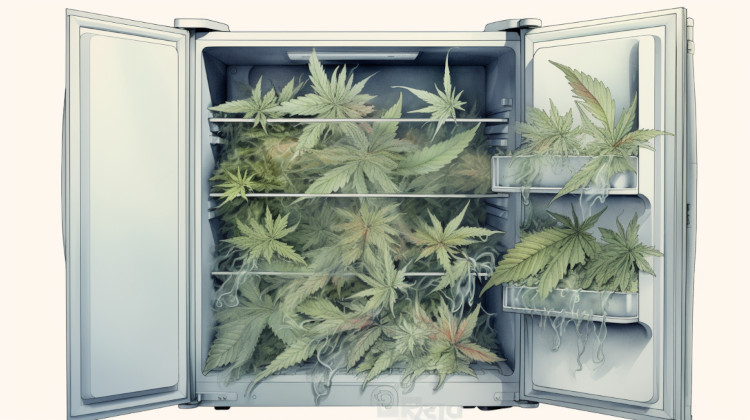
Putting weed in the freezer at home isn't a great idea. Leave it up to the professional processors for the best results.
But if you must try freezing weed on your own, there are a few steps that you should follow.
- Seal your flower in an airtight bag, ideally vacuum-sealed.
- Place your bud in a safe space in the freezer where other items around it won't disturb it. Ideally, you'll have a freezer dedicated to just freezing weed.
- Keep your flower in that space, leaving it undisturbed to remain frozen until ready for processing.
The process of freezing cannabis is complicated. It can seem simple on the surface but requires focus and the right equipment. For many consumers, a DIY method to dry and cure your harvest may be better than the at-home freezer route. Drying and curing at home would require you to hang dry your fresh cannabis from a stringer or wire while keeping the room temperature controlled between 60 and 70 degrees Fahrenheit and humidity levels at 45 to 55%. Remember that those recommended numbers could change depending on the source of information.
Unless you're a cultivation or processing expert, you may want to leave freezing weed to professional manufacturers. Or, at the very least, explore putting weed in the freezer as a casual hobby until you find the process that works best for your space and goals.
Until then, stick to freezing only edibles, tinctures, and topicals. Those typically just need an airtight container and a watchful eye for any issues in the freezer.
Storing Cannabis: Best Practices
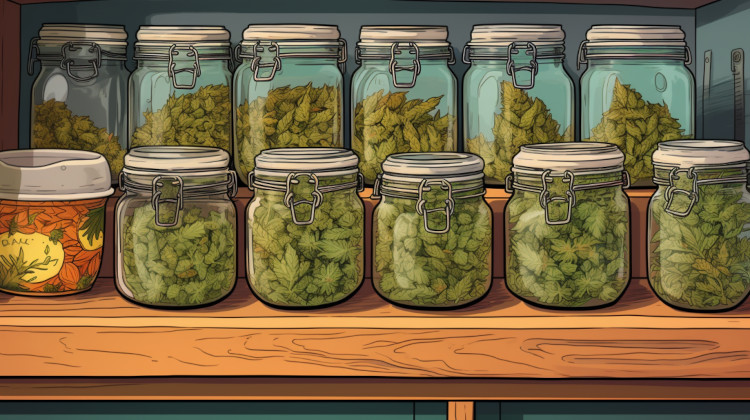
Storing weed in the freezer by now should be at the bottom or entirely off your list of storage options. While the cannabis world is regularly innovating, we aren't throwing out all past methods. Some of what has been tried and true for ages remains the same, and rightfully so.
When storing just about any cannabis product, your best bet is to opt for a cool, dark place with an airtight container, ideally made of aluminum or UV-protected glass.
This type of setting creates the best-case scenario for almost every cannabis product. When stored properly, your item is best suited to avoid mold or freezer burn while slowing the plant degradation process down as best as possible. Remember that a few items, mainly edibles, may do better at room temperature.
Freeze drying certainly has benefits, and there wouldn't be the live concentrates product category if it weren't for it. But few people have the machinery and the know-how to pull it off at home. Leave this up to the experts, or risk harming your cannabis more than doing it any good.
Resources
- Maioli C, Mattoteia D, Amin HIM, Minassi A, Caprioglio D. Cannabinol: History, Syntheses, and Biological Profile of the Greatest "Minor" Cannabinoid. Plants (Basel). 2022;11(21):2896. Published 2022 Oct 28. doi:10.3390/plants11212896 ↩︎
The information in this article and any included images or charts are for educational purposes only. This information is neither a substitute for, nor does it replace, professional legal advice or medical advice, diagnosis, or treatment. If you have any concerns or questions about laws, regulations, or your health, you should always consult with an attorney, physician or other licensed professional.

